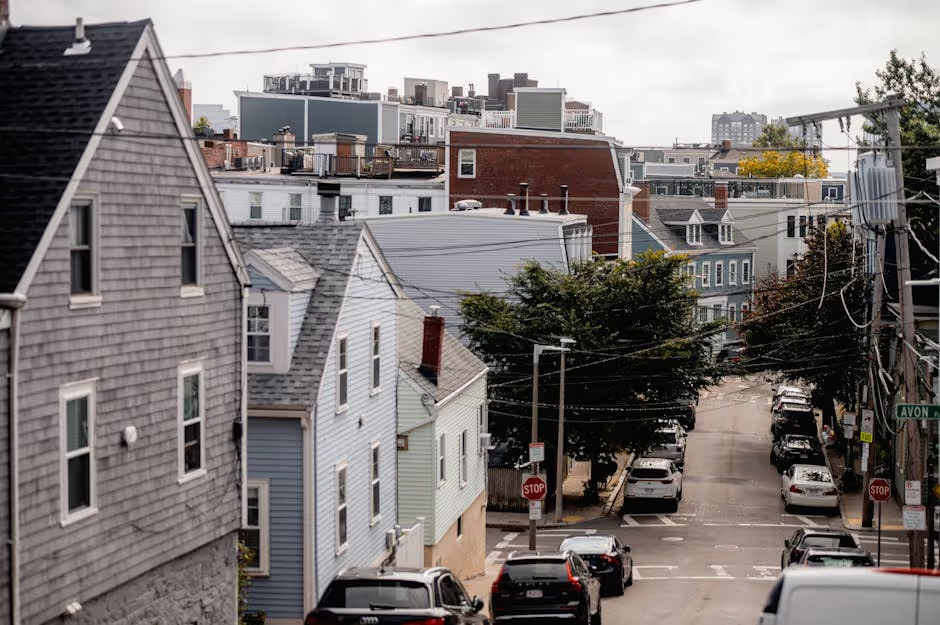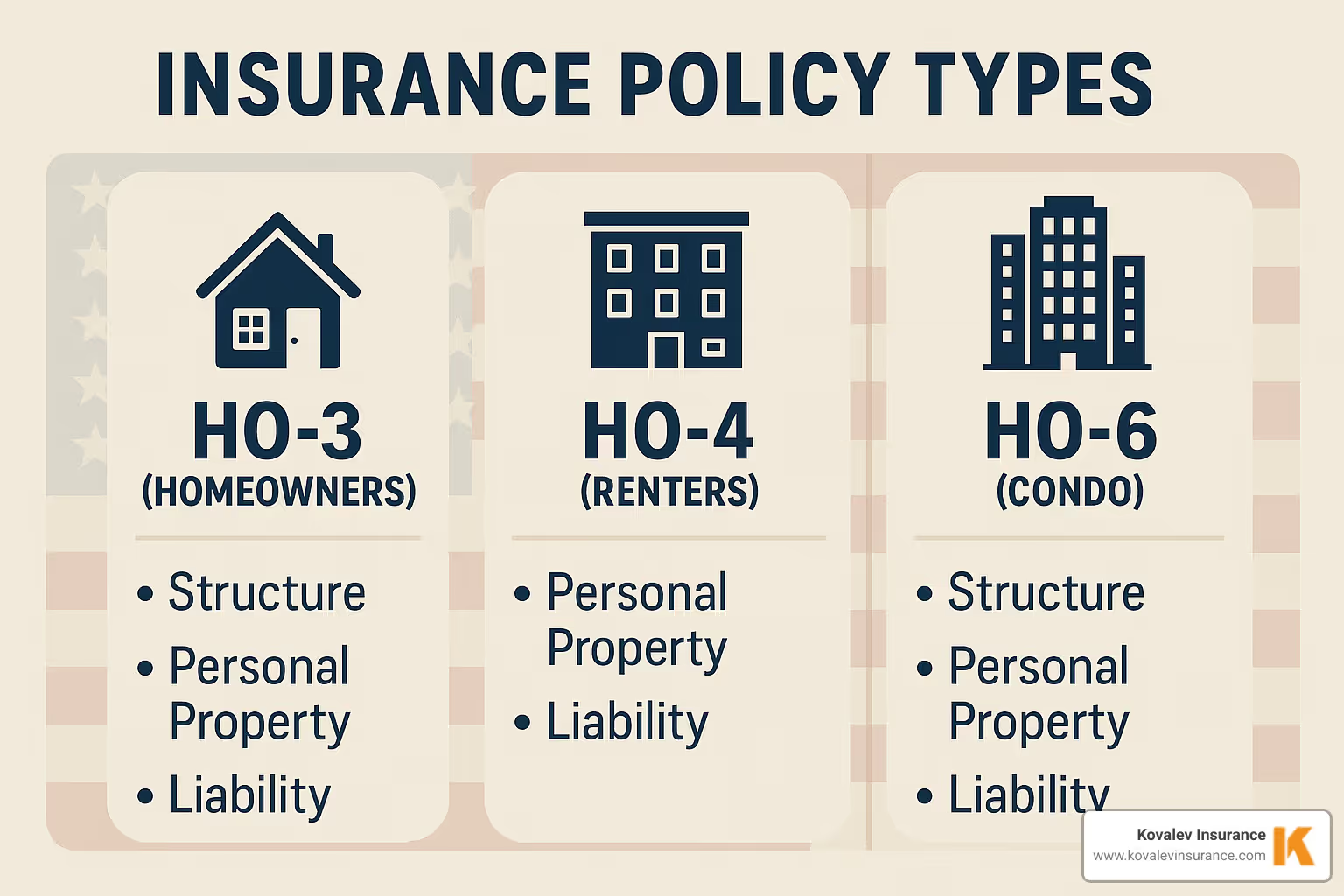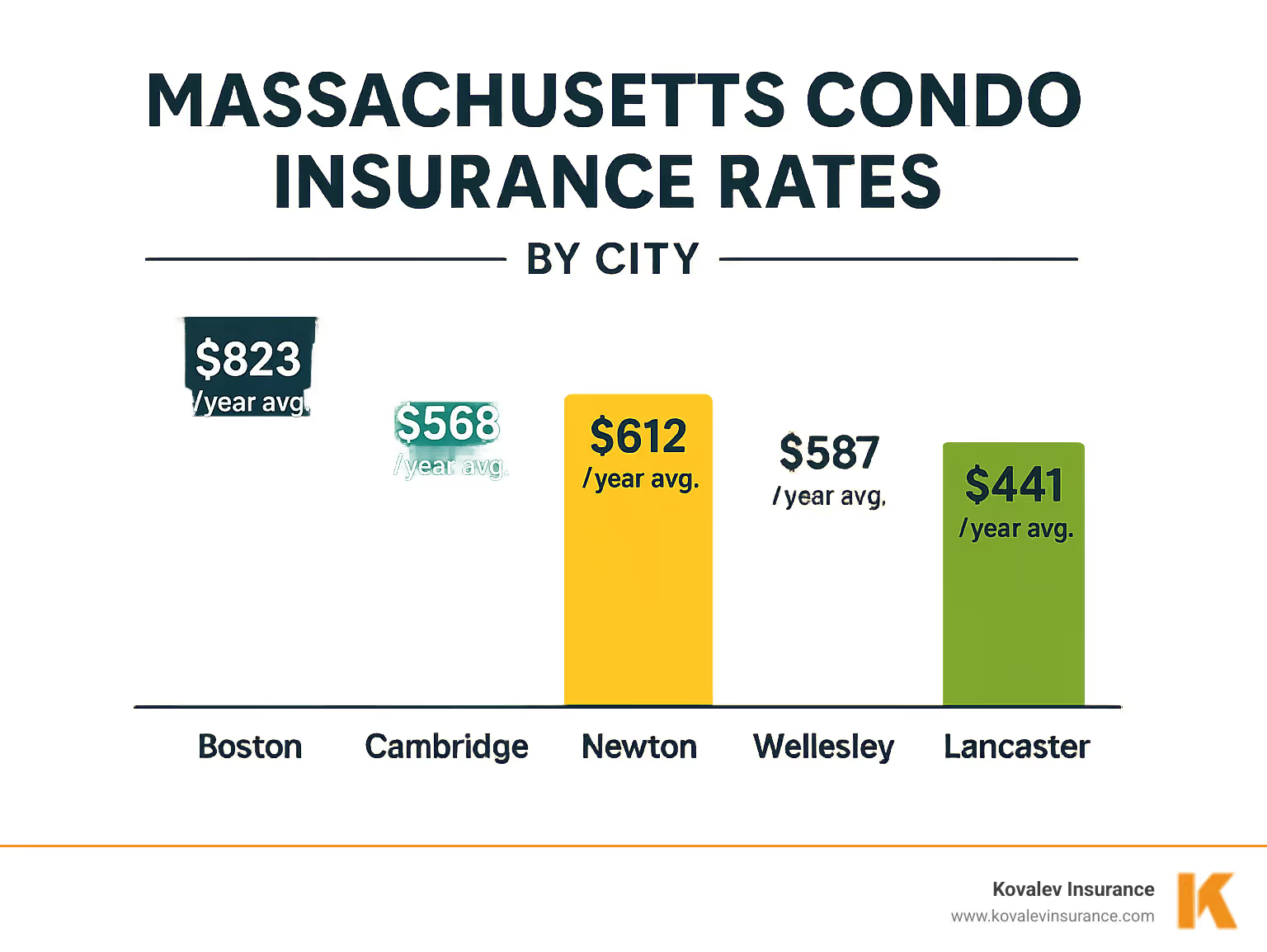Blog Content
25
Aug
2025

If you're looking for a massachusetts condo insurance quote, here's what you need to know:
Condo insurance in Massachusetts operates differently than traditional homeowners insurance. While your condo association's master policy typically covers the building exterior and common areas, it leaves your unit's interior and personal belongings unprotected. This critical gap must be filled with an individual HO-6 policy.

Massachusetts condo insurance quote word list:
Owning a condo in Massachusetts comes with its own unique insurance needs. Unlike a single-family home where one policy covers everything, condo insurance works as part of a two-policy system that can be confusing for new owners.
"The biggest mistake I see new condo buyers make is assuming their condo association's master policy protects everything," shares our senior advisor at Kovalev Insurance. "That misunderstanding can leave you financially exposed after a disaster when you find your beautiful granite countertops and brand-new flooring aren't covered."
Your standard HO-6 condo insurance policy in Massachusetts typically includes:
Dwelling Coverage protects everything from the "walls-in" – think cabinets, built-in bookcases, bathroom fixtures, and those hardwood floors you just installed. This is especially important in older Boston-area buildings where renovations are common.
Personal Property Coverage safeguards your belongings – furniture, clothes, electronics, and even that expensive road bike you keep inside. Most Massachusetts condo owners need between $30,000-$50,000 in coverage, though city dwellers often require more.
Liability Protection defends you financially if someone slips in your Brookline condo and sues, or if your bathtub overflows and damages your downstairs neighbor's ceiling. We typically recommend at least $300,000 in coverage.
Loss of Use Coverage pays for temporary housing if a pipe bursts in February and you can't live in your Newton condo during repairs. This covers hotel costs, additional food expenses, and even pet boarding.
Medical Payments handles smaller medical bills for guests injured in your unit, regardless of who's at fault. Think of it as a goodwill coverage that might prevent a larger liability claim.
The exact coverage you need depends largely on your association's master policy type:
Bare Walls coverage is the most minimal and common in older Massachusetts developments. It covers only the exterior structure and common areas, leaving everything inside your unit (including fixtures and installations) your responsibility.
Single Entity coverage includes the original building materials and fixtures inside your unit but doesn't protect improvements or personal property. This is typical in newer developments around Wellesley and Natick.
Modified Single Entity offers slightly more protection than single entity policies but still has significant gaps. Always verify what's covered by requesting a copy of your association's policy.
As one Newton client finded the hard way: "When my dishwasher leaked and ruined my newly renovated kitchen, I learned my association's policy wouldn't cover my custom cabinets or hardwood floors. I wish I'd understood the difference between their coverage and mine before the damage happened."
More info about Condo Insurance Massachusetts Cover
Understanding the differences between policy types helps Massachusetts residents choose appropriate coverage. These distinctions are formalized through industry-standard policy codes:
HO-3 policies are standard homeowners insurance for single-family homes. When you own a house in Needham or Belmont, this policy covers both the structure and your belongings inside.
HO-4 policies provide renters insurance that covers personal belongings and liability, but not the structure itself. Perfect for Boston's many apartment dwellers.
HO-6 policies are specifically designed for condo owners, covering unit interiors, personal property, and liability while working alongside your association's master policy.

The key difference is what's being insured. With an HO-3 homeowners policy, you're responsible for everything—from the land your house sits on to the roof over your head. With an HO-6 condo policy, you're primarily responsible for your unit's interior and personal property, while the association handles the building exterior and common areas.
A Brookline resident recently shared: "When I downsized from my colonial to a condo near Coolidge Corner, I was pleasantly surprised that my massachusetts condo insurance quote came in significantly lower than my old homeowners policy. But I had to carefully review what my association covered to avoid dangerous gaps in protection."
Scientific research on policy forms
While Massachusetts state law doesn't technically mandate condo insurance for unit owners, in practice, it's nearly impossible to own a condo without it. Three major factors make an HO-6 policy essentially required for Massachusetts condo owners:
"In my two decades helping Massachusetts condo owners, I've never encountered a situation where skipping an HO-6 policy made financial sense," explains our senior claims specialist. "The risk is simply too great, especially considering how affordable most Massachusetts condo policies are."
What's particularly interesting is how requirements vary between different Massachusetts communities:
In Wellesley's luxury developments, HOA bylaws frequently specify minimum liability limits of $500,000 or higher. Brookline's historic brownstone conversions often require improved dwelling coverage to address the potential costs of restoring period details. Meanwhile, newer developments in Needham might focus more on loss assessment coverage minimums due to high master policy deductibles.
A Newton client recently shared: "When I bought my condo last winter, I was surprised to find my association required all owners to carry $50,000 in loss assessment coverage. My agent explained this wasn't arbitrary—our building had a $50,000 master policy deductible for water damage claims, which are unfortunately common during Massachusetts winters."
What is Loss Assessment Coverage Insurance
Understanding your condo association's master policy is perhaps the most crucial step in securing appropriate coverage in Massachusetts. This document essentially determines where association coverage ends and where your personal responsibility begins.
When reviewing your master policy (or asking your agent to do so), focus on these key elements:
Coverage Type: Is it "bare walls" (covering only the exterior structure and common areas), "single entity" (including original fixtures inside your unit), or "modified single entity" (covering some improvements)? This dramatically affects how much dwelling coverage you need.
Deductible Amount and Responsibility: Massachusetts associations often carry deductibles between $5,000 and $25,000—sometimes higher. Many associations can legally pass this cost to unit owners when claims involve their units.
Loss Assessment Provisions: Understand the circumstances under which your association can require unit owners to contribute to covered losses that exceed master policy limits.
"Many of my Belmont clients are shocked when they learn they might be responsible for their share of a $25,000 master policy deductible if a pipe bursts in a common wall," notes our local agent. "That's why loss assessment coverage is particularly valuable for Massachusetts condo owners."
Pay special attention to the "walls-in" definition in your master policy, which precisely outlines what interior elements are covered by the association. Also review how deductibles are allocated among unit owners and the specific circumstances that might trigger special assessments.
A client from Natick recently told us: "After a major fire damaged several units in our building, I was incredibly relieved my agent had recommended $50,000 in loss assessment coverage. When our association assessed each owner $12,000 to cover costs beyond the master policy limits, I was fully protected while some of my neighbors had to scramble for funds."
When shopping for a massachusetts condo insurance quote, understanding your legal obligations helps ensure you get appropriate coverage. While state law doesn't explicitly mandate coverage, the practical requirements create a de facto obligation for virtually all condo owners.
Mortgage lenders throughout Massachusetts typically require proof of adequate condo insurance before closing and maintain escrow accounts to ensure premiums remain current. When requesting a massachusetts condo insurance quote, be prepared to meet these standard lender requirements:
Dwelling coverage equal to at least your loan amount or unit replacement costPersonal property coverage of at least 40% of your dwelling coveragePersonal liability coverage of $300,000 or more (many Massachusetts lenders now require $500,000)Loss of use coverage for at least 20% of your dwelling coverageDeductible no higher than $5,000 (though some lenders allow higher)
"When clients come to us for a massachusetts condo insurance quote, we always start by asking about their mortgage requirements," explains our Newton-based agent. "This ensures the policy we design will satisfy their lender while also providing the personal protection they need for their specific situation and community."
Beyond lender requirements, many HOAs in upscale communities like Wellesley and Brookline have their own insurance mandates written into their bylaws. These might include minimum liability limits, specific endorsements, or requirements to carry loss assessment coverage that matches the association's master policy deductible.
When you own a condo in Massachusetts, your HO-6 policy is your financial safety net. Let's break down exactly what it covers – and what it doesn't.
Your standard Massachusetts condo policy includes six essential protections that work together to shield your investment and peace of mind:
Dwelling Coverage (Coverage A) protects everything from the "walls-in" of your unit. This means if your beautiful hardwood floors in your Newton condo get damaged by a burst pipe, or your kitchen cabinets in your Wellesley unit suffer smoke damage from a fire, you're covered. This protection extends to your interior walls, built-in appliances, electrical wiring, and the HVAC system that serves only your unit.
Personal Property (Coverage C) is what protects your belongings – from your furniture and clothing to electronics and kitchenware. A Brookline client once told me, "I never realized how much stuff I owned until I had to make a claim after a break-in." The good news? This coverage follows your belongings even when they're not in your condo, like if your laptop gets stolen while you're working at a café in Natick.
Loss of Use (Coverage D) might be the most underappreciated coverage until you need it. When a major water leak made a Needham client's unit uninhabitable for three months, this coverage paid for her temporary apartment, the increased cost of eating out, and even the extra gas she used with a longer commute. It covers the additional expenses you face when you can't live in your home due to a covered loss.
Personal Liability (Coverage E) steps in when someone gets injured in your unit or you accidentally damage someone else's property. From legal defense costs to court judgments, this coverage is crucial protection for your financial future.
Medical Payments (Coverage F) covers smaller medical bills for guests injured in your unit, regardless of who's at fault. Think of it as a goodwill coverage that can handle minor injuries without the complications of determining liability.
Loss Assessment Coverage is particularly important for Massachusetts condo owners. When your association levies a special assessment for covered damages to common areas or liability claims, this helps pay your share. After a major hailstorm damaged the roof of a Belmont complex, each owner faced a $5,000 assessment – but those with proper coverage didn't pay a penny out of pocket.
However, your standard HO-6 policy has important exclusions you should know about:
Flood damage isn't covered by standard policies – a critical gap for ground-floor units in flood-prone areas like Back Bay or near the Charles River. For this protection, you'll need separate coverage through the National Flood Insurance Program (NFIP) or private insurers.
Earthquake damage, while rare in Massachusetts, is excluded from standard coverage. The same goes for normal wear and tear, intentional damage, and most losses related to business activities conducted from your home.
"Most Massachusetts condo owners don't realize their policy has these gaps until it's too late," says our claims specialist. "Understanding what's not covered is just as important as knowing what is."
National Flood Insurance Program (NFIP)
Smart Massachusetts condo owners often improve their standard coverage with these valuable add-ons:
Water Backup Coverage is practically essential in Massachusetts, where aging infrastructure meets harsh winter conditions. For about $30-50 annually, you're protected if water backs up through drains or sewer lines – one of the most common and messy disasters in local condos. After the record-breaking snowfall of 2015, many Newton and Wellesley clients who added this coverage avoided thousands in out-of-pocket cleanup costs.
Equipment Breakdown Coverage is like an extended warranty for all your major systems and appliances. When a Brookline client's high-efficiency heating system suddenly failed in January, this $25-35 annual endorsement saved them over $7,000 in replacement costs.
Identity Theft Protection provides resources and financial assistance if your identity is stolen – a growing concern in Massachusetts where data breaches have affected millions of residents. This modest $25-40 annual investment can save countless hours and significant stress if you become a victim.
Scheduled Personal Property provides improved coverage for those special items that exceed standard policy limits – grandmother's diamond ring, your art collection, or those vintage baseball cards. Without this endorsement, most policies limit coverage for such valuables.
Umbrella Insurance adds an extra layer of liability protection beyond your standard limits – crucial for professionals with significant assets to protect. This coverage extends over both your condo and auto policies, providing comprehensive protection for your financial future.
"These endorsements aren't just add-ons we try to sell," explains our Natick agent. "They're targeted protections against the specific risks Massachusetts condo owners face. The small additional premium often pays for itself many times over when disaster strikes."

Shopping for condo insurance in Massachusetts doesn't have to feel overwhelming. Before you start collecting quotes, a little preparation goes a long way in making the process smoother and ensuring you get the most accurate massachusetts condo insurance quote possible.
First, gather your property details. You'll need your complete address (including unit number), the year your building was constructed (particularly important for historic properties in Boston or Cambridge), square footage, and number of bedrooms and bathrooms. Insurance companies also want to know about construction type—whether it's brick, frame, or another material—and any recent updates to electrical, plumbing, heating systems, or the roof.
"Many of our Newton clients are surprised when we ask about recent renovations," says our senior advisor. "But that kitchen remodel or bathroom upgrade actually increases your unit's value and may require additional coverage."
Safety features can significantly reduce your premium, so make note of fire alarms (especially those connected to central monitoring stations), security systems, sprinklers, deadbolts, and smoke detectors. A client in Wellesley saved nearly 15% on her policy simply by documenting the building's comprehensive sprinkler system and her unit's monitored alarm.
Your condo association documents are crucial too. Have your master policy declarations page handy, along with bylaws regarding insurance requirements and HOA contact information. These documents help identify exactly what you're responsible for insuring versus what the association covers.
Personal details matter as well. Be prepared to share your claims history (typically for the past five years), current insurance information, desired coverage limits, and a general inventory of valuable possessions. One Brookline resident finded he was significantly underinsured for his art collection until he created a proper inventory before requesting a new massachusetts condo insurance quote.
Finally, consider your financial preferences, including your desired deductible amount and mortgage company details if applicable. Higher deductibles generally mean lower premiums, but you'll pay more out-of-pocket when filing a claim.
The cost of condo insurance in Massachusetts varies dramatically by location. The statewide average is $669 annually (about $56 monthly), but there's considerable range:

"Location impacts Massachusetts condo insurance rates more than almost any other factor," explains our Natick agent. "A downtown Boston unit might cost nearly twice as much to insure as a similar property in western Massachusetts simply due to differences in rebuilding costs, crime statistics, and claim frequency in those areas."
Your coverage selections also significantly affect your premium costs:
Condo Insurance Mass Average Cost
When you're ready to request a massachusetts condo insurance quote, you have two main options: online quoting tools or working with a local independent agent.
Many insurers offer digital platforms where you can enter your information and receive an estimate within minutes. These online tools are convenient and accessible 24/7, but they sometimes struggle with the complexities of Massachusetts condo insurance. As one Needham client put it: "The online form kept asking questions I couldn't answer about my master policy. I wasn't even sure what some terms meant."
That's where local independent agents shine. These professionals understand the nuances of Massachusetts condo associations and can review your community's master policy to identify potential coverage gaps. They'll explain state-specific considerations, compare options from multiple insurance companies, and recommend appropriate endorsements based on your unique situation.
"When I tried getting a massachusetts condo insurance quote online, I was completely confused by questions about my association's master policy," shares a Brookline resident. "Working with a local agent who understood Massachusetts condo laws made everything clearer and actually saved me money by preventing duplicate coverage."
To speed up your quoting process, have your current policy handy (if you have one), understand your mortgage company's requirements, know your association's master policy type, prepare a rough inventory of your belongings' value, and document all safety features in your unit and building.
Several location-specific factors influence what you'll pay for condo insurance in these Massachusetts communities.
While Newton, Belmont, and Natick aren't coastal areas, they still experience severe New England weather that impacts rates. The February 2015 record snowfall, for instance, caused millions in insurance claims across these communities from roof collapses and ice dams.
Urban density varies significantly between these towns. Parts of Newton have a more city-like environment with different risk profiles than the more suburban settings in Natick. As our underwriting specialist notes, "Density affects everything from fire spread potential to theft probability."
Building age and construction type matter tremendously in Massachusetts. Historic properties in Newton and Belmont often have higher replacement costs due to architectural details and materials that are expensive to replicate today. A Victorian-era brownstone conversion in Newton Centre typically costs more to insure than a newly-built condo in Natick.
Local crime statistics factor into premiums too. Different neighborhoods within Newton have varying crime profiles compared to parts of Belmont or Natick. Insurance companies track these patterns closely when setting rates.
Each Massachusetts municipality has its own fire protection classification based on fire department response times, hydrant availability, and other safety factors. This rating directly impacts what you'll pay for coverage.
"We often see premium differences of 15-20% between similar units in different Massachusetts communities," explains our senior advisor. "For example, a client who moved from Belmont to Natick saw her premium decrease by 18% despite increasing her coverage limits, primarily due to differences in local risk factors."
General Liability Insurance MA Cost
Let's face it – while condo insurance is essential, nobody wants to pay more than necessary. The good news? Massachusetts condo owners have plenty of ways to trim those premiums without sacrificing protection.
"I always tell my clients that saving on condo insurance is like finding money in your coat pocket – it's surprisingly easy once you know where to look," shares our Newton agent with a smile.
Bundling your condo and auto policies remains one of the simplest yet most effective strategies. Massachusetts residents typically save around 7% on their auto insurance and 5-15% on their condo coverage just by combining policies with the same company. One Wellesley client recently saved nearly $300 annually through bundling alone!
Your condo's safety features can significantly impact your rates too. Massachusetts insurers love properties with monitored security systems (5-15% savings), automatic sprinkler systems (5-10% off), and those increasingly popular water leak detection devices (another 5-10% discount). These not only protect your home but also your wallet.
"After the brutal winter of 2015, I installed a water leak detection system in my Brookline condo," recalls one client. "Not only did my premium drop by 8%, but I avoided a potentially devastating pipe burst last February when the system detected a small leak before it became catastrophic."
Your claims history matters tremendously in Massachusetts. Many insurers reward claim-free policyholders with discounts reaching up to 20% after 3-5 years without filing. Even simple changes like enrolling in paperless billing (1-3% savings) or paying your annual premium upfront rather than monthly (5-10% discount) can make a meaningful difference.
First-time condo buyers in Boston's competitive market should ask about new buyer credits – several Massachusetts insurers offer special rates for new purchases, recognizing that newer owners often take better care of their properties.
Personal Insurance Agency Newton Massachusetts
When reviewing your massachusetts condo insurance quote, don't leave money on the table. Use this checklist during your next policy review:
"One often-overlooked discount applies to Massachusetts condo associations with professional management," notes our Wellesley agent. "Some insurers view professionally managed buildings as lower risk and offer unit owners a 3-5% discount. It's worth asking about if your association recently switched to professional management."
Want better protection without spending more? Consider these smart strategies:
Increasing your deductible from $500 to $1,000 typically saves 10-15% on premiums. Massachusetts residents with healthy emergency funds often find this trade-off worthwhile. That savings can then be redirected toward more valuable coverage.
Rather than raising your overall personal property limits to cover a few valuable items, consider scheduling high-value possessions separately. This targeted approach provides better protection (often with no deductible for those items) while keeping your base premium manageable.
Focus on loss assessment coverage – this relatively inexpensive endorsement (often just $25-50 annually) provides substantial protection against special assessments, which have become increasingly common in Massachusetts condos with aging infrastructure.
"A client in Natick was worried about their association's aging roof," shares our agent. "By adding $50,000 in loss assessment coverage for just $42 a year, they gained peace of mind without significantly impacting their budget. Six months later, when the association levied a special assessment for roof replacement, that small investment saved them over $8,000."
Remember to review your coverage annually as property values and personal belongings change. A Needham client recently realized she was paying for $100,000 in personal property coverage but only owned about $60,000 worth of belongings. By adjusting this limit and using the savings to increase her loss assessment coverage, she maintained her premium while better aligning protection with her actual needs.
Small changes can make a big difference in your Massachusetts condo insurance costs – without leaving you vulnerable when you need protection most.

Living in a Massachusetts condo means facing some unique risks that differ from single-family homes. Whether you're in a high-rise in Boston or a garden-style condo in Natick, understanding common claim scenarios can help you prepare for the unexpected.
"The most important thing I tell my Massachusetts condo clients is to document everything before disaster strikes," says our Newton claims specialist. "Having photos of your unit in good condition makes proving damage so much easier later."
Massachusetts condo owners frequently encounter these claim situations:
Kitchen Fires are surprisingly common in our state. In fact, Massachusetts consistently ranks among the highest in the nation for per-capita kitchen fires. The density of Boston and Cambridge multi-unit buildings makes these fires particularly concerning, as they can affect neighboring units.
Frozen and Burst Pipes are a winter reality in New England. When temperatures plummet in January and February, older buildings in communities like Brookline and Newton are especially vulnerable. One Wellesley client shared: "I returned from a weekend away to find my kitchen ceiling collapsed from a frozen pipe that burst in the bathroom above. Thank goodness my HO-6 policy covered the damage to my unit."
Nor'easter Damage affects condos across the state, from coastal properties to inland communities like Needham. These powerful storms bring wind damage, water infiltration, and often lengthy power outages that can lead to additional problems like spoiled food or frozen pipes.
Theft remains a concern, particularly in urban areas. While property crime rates vary significantly between communities like Belmont (lower) and parts of Boston (higher), personal property coverage is essential regardless of location.
Water Damage from Units Above is perhaps the most common multi-unit building claim. A Natick client told us: "My neighbor's washing machine hose failed while they were at work. By the time they got home, my ceiling, walls, and hardwood floors were severely damaged."
When disaster strikes, follow these essential steps:
First, ensure everyone's safety by addressing immediate dangers. Turn off electricity if there's water damage, evacuate if there's fire, and call emergency services if needed.
Next, document everything thoroughly. Take clear photos and videos of all damage before you start cleanup. Make a detailed list of damaged items, noting their approximate age and value. Save all receipts for emergency repairs or temporary housing.
Then, take reasonable steps to prevent further damage. This might mean placing buckets under leaks, covering broken windows with plastic, or removing undamaged furniture from wet areas. Your policy requires you to mitigate additional damage when possible.
Promptly contact your insurance agent or company. The sooner you report the claim, the faster the process can begin. Be prepared to share your documentation and answer questions about what happened.
Finally, clarify coverage responsibilities between your policy and the association's master policy. This can be confusing, but it's crucial. Your agent can help determine which policy should respond to which aspects of the damage.
"After a major water leak damaged three units in our Brookline building, there was confusion about which policy covered what," recalls a client. "My agent coordinated with the association's insurance representative to make sure everything was properly handled without duplication."
Understanding what happens after you file a claim helps set realistic expectations and reduces stress during an already difficult time.
During the immediate response phase (first 24 hours), your priority is safety and reporting. Contact your insurance company's claims department or your agent to start the process. They'll assign you a claim number and explain next steps. If your unit is uninhabitable, your loss of use coverage can help with temporary accommodations.
Within 1-2 days, expect your claim to be assigned to an adjuster who will reach out to schedule an inspection. Massachusetts regulations require prompt claim handling, so this initial contact typically happens quickly.
The investigation phase (typically 3-10 days) includes the adjuster's inspection of the damage, review of your documentation, and determination of coverage. The adjuster will prepare an initial estimate for repairs based on local Massachusetts construction costs, which vary significantly between communities like Boston (higher) and outlying areas like Natick (lower).
The approval and payment phase (7-30 days) begins when you receive a settlement offer. If the offer seems insufficient, don't hesitate to discuss your concerns with the adjuster. Massachusetts insurance regulations protect consumers from unfair settlement practices. Once approved, you'll receive an initial payment and can begin selecting contractors.
The repairs and final settlement phase varies in length depending on the extent of damage and availability of contractors. In high-demand periods (like after major storms), repair timelines can extend significantly. Once repairs are complete, you may receive a final payment for any recoverable depreciation if you have replacement cost coverage.
"Massachusetts law requires insurers to acknowledge claims within 10 days and make a decision within 30 days after receiving proof of loss," explains our claims specialist. "But most reputable insurers respond much more quickly, especially for severe damage that affects habitability."
A Needham client shared: "After a fire in my kitchen, I was impressed with how quickly the adjuster inspected the damage and approved my claim. I had an initial payment within a week, which helped me secure a contractor before they got booked up."
Getting a massachusetts condo insurance quote before disaster strikes ensures you have the right coverage when you need it most. The time to understand your policy is before you have to use it.
This is one of the most common questions we hear from condo owners in Massachusetts, whether you’re in Newton, Belmont, or right in the heart of Boston. The short answer? Your HOA’s master policy covers the building—your HO-6 policy covers your world inside it.
To break it down: the master policy is chosen by your condo association and usually takes care of the big stuff—think the roof, exterior walls, hallways, elevators, and other shared spaces. Depending on your association, the master policy might be a bare walls, single entity, or modified single entity type. Each has its own rules for where your responsibility as a unit owner begins.
Your HO-6 policy, on the other hand, is all about the things that make your condo yours: your floors, built-in cabinets, appliances, and personal belongings. It also protects you with personal liability coverage if someone gets hurt in your unit. In Massachusetts, it’s especially important to review your association’s master policy (don’t just assume it’s the same as your neighbor’s building across town). As our agent in Needham likes to say, "No two master policies are exactly alike—so be sure to check the details!"
Yes—this is a helpful perk, especially for folks on the go! Most standard HO-6 condo policies in Massachusetts will cover your personal property, even if it’s not physically inside your condo. That means if your phone is stolen from your car in Natick, or your bike takes a spill while you’re visiting friends in California, your policy usually steps in.
That said, there are limits to how far your coverage travels. Typically, items kept in a storage unit or at a second home will only be insured up to 10% of your personal property limit. Also, standard coverage applies only to named perils—unless you’ve chosen an all-risk upgrade. High-value items like jewelry or fancy electronics often have “caps” unless you specifically schedule them for extra protection.
As one of our clients in Brookline found out the hard way, her stolen $3,200 camera was only covered up to the $2,500 special limit for electronics. Since then, we always recommend that anyone with valuables talk to their agent about scheduling them on their policy. It’s a small step with big peace of mind.
This one catches many Massachusetts condo owners off guard: Standard HO-6 condo insurance does not cover damage from floods or earthquakes. If your building is near the Charles River in Cambridge or in a flood-prone zone in Boston, you’ll need to look into separate flood insurance—either through the National Flood Insurance Program (NFIP) or with a private insurer.
And about earthquakes? While they’re rare around here, they’re not impossible (just ask folks about the 1755 Cape Ann quake!). If you want earthquake protection, you’ll need to add a special earthquake endorsement or buy a separate policy. This can be especially important if you live in areas like Boston’s Back Bay or the Seaport, which are built on filled land and could be more vulnerable to shaking.
If you’re ever unsure what your massachusetts condo insurance quote covers, or whether you need extra protection, just reach out to your local agent who knows the ins and outs of Massachusetts condo living. We’re always happy to help break down what’s covered—and what’s not—so you can make the best choice for your home.

Finding the right condo insurance in Massachusetts isn’t just about ticking boxes—it’s about real protection for your home, your wallet, and your peace of mind. From Newton to Natick, every condo and community is a little different, but a few key steps can make sure you’re covered where it matters most.
Start by getting to know your association’s master policy. This is the document that spells out what the HOA already insures (think: the roof, exterior walls, and common areas). Then, review your own needs—what’s inside your four walls, from hardwood floors to your favorite armchair. It’s smart to make a home inventory, so you’re not left guessing the value of your personal belongings if the worst happens.
Don’t forget, living in Massachusetts comes with its own set of surprises—icy winters, sudden Nor’easters, and the quirks of older buildings. This means your coverage should be custom, not just generic. Look for insurance that considers these risks, and don’t be shy about asking questions.
Saving money is always nice, too! Many folks in Boston, Newton, and surrounding towns lower their premiums by bundling with auto insurance, adding safety devices like monitored alarms, or simply staying claims-free. A few small tweaks—like choosing paperless billing, or bumping up your deductible if you have a rainy-day fund—can add up to real savings.
Insurance isn’t “set it and forget it.” As your life changes, so should your policy. Review your coverage each year, especially if you renovate, buy new valuables, or your association changes its master policy.
The team at Kovalev Insurance knows that every condo owner’s situation is unique. We’re proud to help our neighbors in Newton, Wellesley, Brookline, Needham, Belmont, and Natick find the right balance between affordability and protection—without any jargon or guesswork.
So, if you’re ready for a massachusetts condo insurance quote that’s truly custom to your needs (not just a copy-paste job), take the next step. Reach out today and let’s make sure your slice of Massachusetts is protected, personalized, and budget-friendly.
For more tips and guidance on the best home and condo coverage options, check out our comprehensive resource here.
Your future self—and your bank account—will thank you!
X